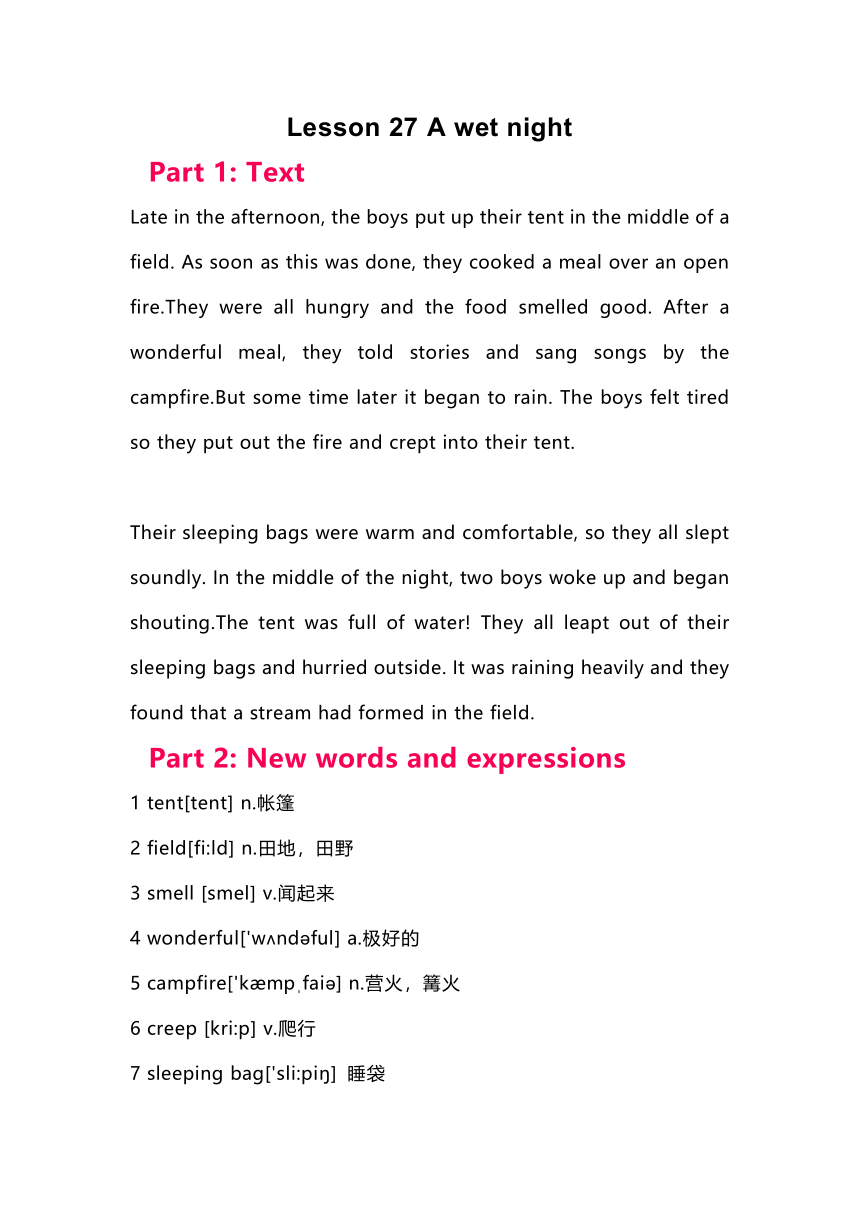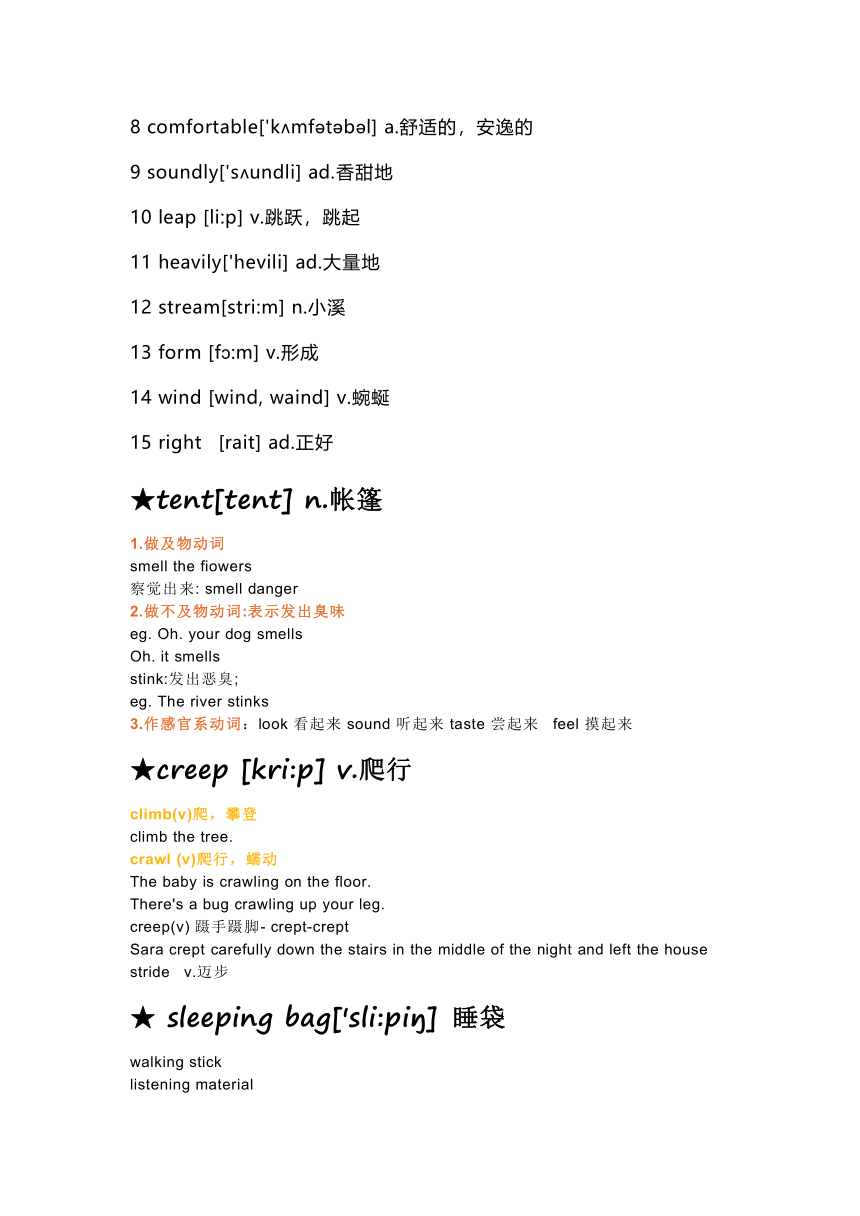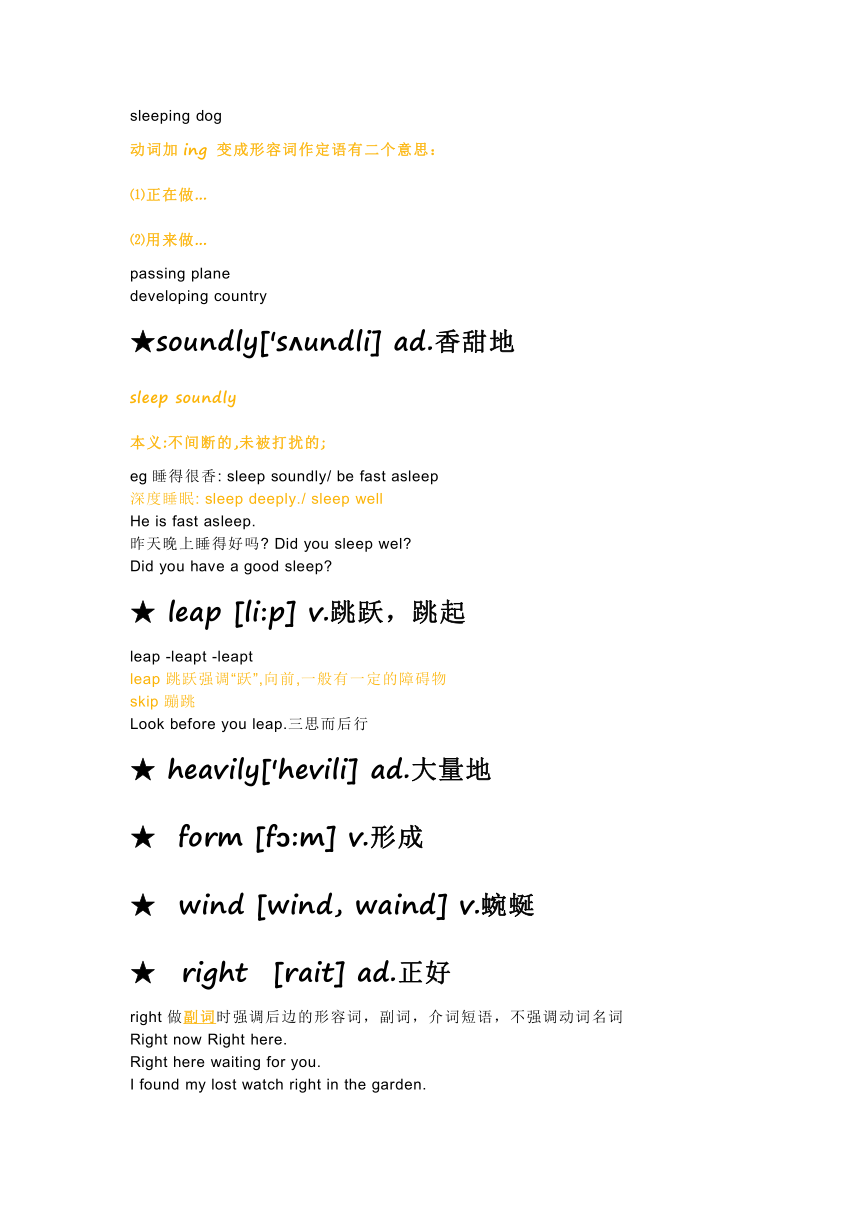新概念英语第二册 Lesson 27 A wet night 讲义
文档属性
| 名称 | 新概念英语第二册 Lesson 27 A wet night 讲义 |  | |
| 格式 | docx | ||
| 文件大小 | 21.7KB | ||
| 资源类型 | 教案 | ||
| 版本资源 | 新概念英语 | ||
| 科目 | 英语 | ||
| 更新时间 | 2023-09-24 22:32:39 | ||
图片预览



文档简介
Lesson 27 A wet night
Part 1: Text
Late in the afternoon, the boys put up their tent in the middle of a field. As soon as this was done, they cooked a meal over an open fire.They were all hungry and the food smelled good. After a wonderful meal, they told stories and sang songs by the campfire.But some time later it began to rain. The boys felt tired so they put out the fire and crept into their tent.
Their sleeping bags were warm and comfortable, so they all slept soundly. In the middle of the night, two boys woke up and began shouting.The tent was full of water! They all leapt out of their sleeping bags and hurried outside. It was raining heavily and they found that a stream had formed in the field.
Part 2: New words and expressions
1 tent[tent] n.帐篷
2 field[fi:ld] n.田地,田野
3 smell [smel] v.闻起来
4 wonderful['w nd ful] a.极好的
5 campfire['k mp fai ] n.营火,篝火
6 creep [kri:p] v.爬行
7 sleeping bag['sli:pi ] 睡袋
8 comfortable['k mf t b l] a.舒适的,安逸的
9 soundly['s undli] ad.香甜地
10 leap [li:p] v.跳跃,跳起
11 heavily['hevili] ad.大量地
12 stream[stri:m] n.小溪
13 form [f :m] v.形成
14 wind [wind, waind] v.蜿蜒
15 right [rait] ad.正好
★tent[tent] n.帐篷
1.做及物动词
smell the fiowers
察觉出来: smell danger
2.做不及物动词:表示发出臭味
eg. Oh. your dog smells
Oh. it smells
stink:发出恶臭;
eg. The river stinks
3.作感官系动词:look 看起来 sound 听起来 taste 尝起来 feel 摸起来
★creep [kri:p] v.爬行
climb(v)爬,攀登
climb the tree.
crawl (v)爬行,蠕动
The baby is crawling on the floor.
There's a bug crawling up your leg.
creep(v) 蹑手蹑脚- crept-crept
Sara crept carefully down the stairs in the middle of the night and left the house
stride v.迈步
★ sleeping bag['sli:pi ] 睡袋
walking stick
listening material
sleeping dog
动词加ing 变成形容词作定语有二个意思:
⑴正在做...
⑵用来做...
passing plane
developing country
★soundly['s undli] ad.香甜地
sleep soundly
本义:不间断的,未被打扰的;
eg睡得很香: sleep soundly/ be fast asleep
深度睡眠: sleep deeply./ sleep well
He is fast asleep.
昨天晚上睡得好吗 Did you sleep wel
Did you have a good sleep
★ leap [li:p] v.跳跃,跳起
leap -leapt -leapt
leap 跳跃强调“跃”,向前,一般有一定的障碍物
skip 蹦跳
Look before you leap.三思而后行
★ heavily['hevili] ad.大量地
★ form [f :m] v.形成
★ wind [wind, waind] v.蜿蜒
★ right [rait] ad.正好
right 做副词时强调后边的形容词,副词,介词短语,不强调动词名词
Right now Right here.
Right here waiting for you.
I found my lost watch right in the garden.
Eg.
--Jimmy,where are my glasses?I have looked everywhere.
--Oh,Granny.They are _____ on your nose.( )
A.evenB.wellC.rightD.ever
Part 3: Notes on the text
★ Late in the afternoon, the boysput up their tentin the middle of afield.
★The stream wound its way across the field and then flowed right under their tent!
Part 4: Grammar&Difficult points
1.一般过去时的构成
一般过去时是用动词的过去式来表示。
His words fetched a laugh from all present.
他的话使在场的人都笑了。
I did not sleep well last night.
我昨晚没睡好。
Did you direct the tourist to the hotel?
你告诉这位游客去旅馆的路了吗?
2.一般过去时的用法
①一般过去时的基本用法
a.表示过去某个特定时间发生的动作或存在的状态
He suddenly fell ill yesterday.
昨天他突然生病了。
The engine stopped because the fuel was used up.
发动机因燃料用光而停机了。
注意:在一般过去时的句子中,通常都要有表示过去的时间状语。
【误】I visited the Palace Museum.
(在没有上下文的情况下,应避免这样说)
【正】I visited the Palace Museum last year.
去年我参观过故宫博物院。
【正】I have visited the Palace Museum.
我参观过故宫博物院。
b.表示过去经常发生的动作或存在的状态
I wrote home once a week at college.
我上大学时每周给家里写一封信。
He was already in the habit of reading widely in his boyhood.
他童年时就养成了广泛阅读的习惯。
提示:表示过去的习惯性动作,除了用过去式外,还可以用used to或would来表示。
She used to study late into the night when she was in Senior Three.
她上高三时经常学习到深夜。
He would sit for hours doing nothing.
过去他常常一坐几个钟头什么事也不做。
c.表示过去连续发生的一系列动作
She entered the room,picked up a magazine and looked through it carefully.
她走进房间,拿起一本杂志,认真地翻阅了起来。
The students got up early in the morning,did morning exercises and then read English aloud in the open air.
学生们很早起床,做早操,然后在室外朗读英语。
d.在时间、条件状语从句中表示过去将要发生的动作
We would not leave until the teacher came back.
老师回来我们才会离开。
She told me she would not go if it rained the next day.
她告诉我如果第二天下雨的话,她就不去了。
Part 5: Homework
1.背诵lesson 27单词&课文
2.Retell the text
3.练习总结课文
Part 1: Text
Late in the afternoon, the boys put up their tent in the middle of a field. As soon as this was done, they cooked a meal over an open fire.They were all hungry and the food smelled good. After a wonderful meal, they told stories and sang songs by the campfire.But some time later it began to rain. The boys felt tired so they put out the fire and crept into their tent.
Their sleeping bags were warm and comfortable, so they all slept soundly. In the middle of the night, two boys woke up and began shouting.The tent was full of water! They all leapt out of their sleeping bags and hurried outside. It was raining heavily and they found that a stream had formed in the field.
Part 2: New words and expressions
1 tent[tent] n.帐篷
2 field[fi:ld] n.田地,田野
3 smell [smel] v.闻起来
4 wonderful['w nd ful] a.极好的
5 campfire['k mp fai ] n.营火,篝火
6 creep [kri:p] v.爬行
7 sleeping bag['sli:pi ] 睡袋
8 comfortable['k mf t b l] a.舒适的,安逸的
9 soundly['s undli] ad.香甜地
10 leap [li:p] v.跳跃,跳起
11 heavily['hevili] ad.大量地
12 stream[stri:m] n.小溪
13 form [f :m] v.形成
14 wind [wind, waind] v.蜿蜒
15 right [rait] ad.正好
★tent[tent] n.帐篷
1.做及物动词
smell the fiowers
察觉出来: smell danger
2.做不及物动词:表示发出臭味
eg. Oh. your dog smells
Oh. it smells
stink:发出恶臭;
eg. The river stinks
3.作感官系动词:look 看起来 sound 听起来 taste 尝起来 feel 摸起来
★creep [kri:p] v.爬行
climb(v)爬,攀登
climb the tree.
crawl (v)爬行,蠕动
The baby is crawling on the floor.
There's a bug crawling up your leg.
creep(v) 蹑手蹑脚- crept-crept
Sara crept carefully down the stairs in the middle of the night and left the house
stride v.迈步
★ sleeping bag['sli:pi ] 睡袋
walking stick
listening material
sleeping dog
动词加ing 变成形容词作定语有二个意思:
⑴正在做...
⑵用来做...
passing plane
developing country
★soundly['s undli] ad.香甜地
sleep soundly
本义:不间断的,未被打扰的;
eg睡得很香: sleep soundly/ be fast asleep
深度睡眠: sleep deeply./ sleep well
He is fast asleep.
昨天晚上睡得好吗 Did you sleep wel
Did you have a good sleep
★ leap [li:p] v.跳跃,跳起
leap -leapt -leapt
leap 跳跃强调“跃”,向前,一般有一定的障碍物
skip 蹦跳
Look before you leap.三思而后行
★ heavily['hevili] ad.大量地
★ form [f :m] v.形成
★ wind [wind, waind] v.蜿蜒
★ right [rait] ad.正好
right 做副词时强调后边的形容词,副词,介词短语,不强调动词名词
Right now Right here.
Right here waiting for you.
I found my lost watch right in the garden.
Eg.
--Jimmy,where are my glasses?I have looked everywhere.
--Oh,Granny.They are _____ on your nose.( )
A.evenB.wellC.rightD.ever
Part 3: Notes on the text
★ Late in the afternoon, the boysput up their tentin the middle of afield.
★The stream wound its way across the field and then flowed right under their tent!
Part 4: Grammar&Difficult points
1.一般过去时的构成
一般过去时是用动词的过去式来表示。
His words fetched a laugh from all present.
他的话使在场的人都笑了。
I did not sleep well last night.
我昨晚没睡好。
Did you direct the tourist to the hotel?
你告诉这位游客去旅馆的路了吗?
2.一般过去时的用法
①一般过去时的基本用法
a.表示过去某个特定时间发生的动作或存在的状态
He suddenly fell ill yesterday.
昨天他突然生病了。
The engine stopped because the fuel was used up.
发动机因燃料用光而停机了。
注意:在一般过去时的句子中,通常都要有表示过去的时间状语。
【误】I visited the Palace Museum.
(在没有上下文的情况下,应避免这样说)
【正】I visited the Palace Museum last year.
去年我参观过故宫博物院。
【正】I have visited the Palace Museum.
我参观过故宫博物院。
b.表示过去经常发生的动作或存在的状态
I wrote home once a week at college.
我上大学时每周给家里写一封信。
He was already in the habit of reading widely in his boyhood.
他童年时就养成了广泛阅读的习惯。
提示:表示过去的习惯性动作,除了用过去式外,还可以用used to或would来表示。
She used to study late into the night when she was in Senior Three.
她上高三时经常学习到深夜。
He would sit for hours doing nothing.
过去他常常一坐几个钟头什么事也不做。
c.表示过去连续发生的一系列动作
She entered the room,picked up a magazine and looked through it carefully.
她走进房间,拿起一本杂志,认真地翻阅了起来。
The students got up early in the morning,did morning exercises and then read English aloud in the open air.
学生们很早起床,做早操,然后在室外朗读英语。
d.在时间、条件状语从句中表示过去将要发生的动作
We would not leave until the teacher came back.
老师回来我们才会离开。
She told me she would not go if it rained the next day.
她告诉我如果第二天下雨的话,她就不去了。
Part 5: Homework
1.背诵lesson 27单词&课文
2.Retell the text
3.练习总结课文
同课章节目录
